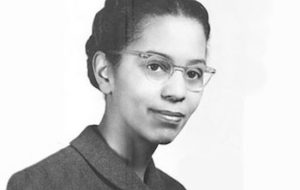
Willa B. Player
*Willa B. Player was born on this date in 1909. She was a Black educator and civil rights activist.
Willa Beatrice Player was born in Jackson, Mississippi, in a frame house on Rose Street. Her mother was Beatrice Day Player, and her father was Clarence Cromwell Player. In 1917, she and her family moved to Akron, Ohio, where she graduated from public school in 1925. She attended Akron University and then Ohio Wesleyan, transferring to be with her sister. She graduated in 1929. After receiving her MA from Oberlin College in 1930, Player was hired to teach Latin and French at Bennett College. Early on, Player was made director of Religious Activities; she was twenty-one.
Following her study abroad, receiving the Certificat d’Etudes from the University of Grenoble, France, in 1935, Player was made Director of Admissions at the College and Acting Dean. In 1948, Player earned her Ph.D. from Columbia University. In 1952, she was named Coordinator of Instruction at Bennett College, Vice President in 1955, acting president, and then president in 1956. She served as president until 1966 when she became director of the division of college support at the U. S. Office of Education and Department of Health, Education, and Welfare, where she served until her retirement in 1986.
In 1958, while at Bennett, Dr. Player organized a speech by the Rev. Martin Luther King Jr. when no other group in Greensboro would welcome him. King spoke that February before an audience of hundreds in the Pfeiffer Chapel. The speech planted the seed for many of the protests in the city. Four North Carolina A&T State University students staged a sit-in at Woolworth's lunch counter in downtown Greensboro two years later. Bennett students had wanted to stage a similar demonstration months earlier, but faculty members dissuaded them, fearing for their safety. Once the demonstrations began, however, Bennett students and faculty members joined in. At the peak of desegregation protests downtown, as much as 40 percent of Bennett's student body was arrested. Dr. Player backed her students, the Bennett Belles, visiting them daily and arranging for professors to hold classes and administer student exams.
Throughout her career, Player had much experience being the first and “only one of her kind” in many leadership roles. In 1929, she was the first Black cadet teacher (practice teacher) in the public schools of Akron, Ohio. In 1962, she became the first woman president of the National Association of Schools and Colleges of the Methodist Church. She was also the first black woman to serve as a Trustee of Ohio Wesleyan.
In 1966, she was the first woman leader in the Department of Developing Institutions in the U.S. Department of Health, Education, and Welfare. She was also the first woman President of Bennett College and the first black woman in the country to serve as president of a four-year, fully accredited liberal arts college. When she retired, the Bennett College Trustees proudly designated her President Emerita.
The list of organizations, boards, commissions, and national committees includes the National Commission on Religion and Race of the Methodist Church; the Board of Trustees of the Southern Fellowship Fund; the Commission of Liberal Learning of the American Association of Colleges; and the Board of Trustees of Clark College. Player received eight honorary doctorates and a long list of citations from national, federal, and local organizations. Willa Player died on August 27, 2003. She was 94.
The Center For Rule of Law.org
Black Women in America An Historical Encyclopedia
Volumes 1 and 2, edited by Darlene Clark Hine
Copyright 1993, Carlson Publishing Inc., Brooklyn, New York
ISBN 0-926019-61-9